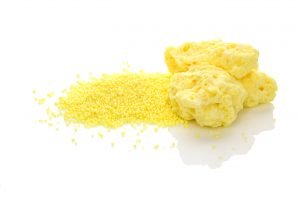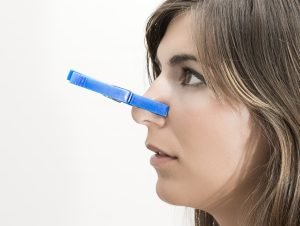
Page Contents
Most people who care about their hair are always keeping an eye out for small things they can do to help it grow thicker, longer, or just to help it look better. Sulfur is a common enough thing that is easy to find, and it just might be the next best thing to try out for your hair.
In order to try sulfur for your hair, however, you probably want to know more about sulfur. Knowing the many benefits that sulfur can have on your scalp can also let you know what to expect from using it.
Finally, saying that you’ll start using sulfur is all well and good, but knowing a few ways that you can actually do so is something you will need to know as well.
What Is Sulfur
Sulfur is something that is very important for human bodies to have. In fact, sulfur is so abundant in the human body that it is the third most common element in your system. Nearly half of this amount of sulfur is in your skin, muscles, and bones, but it also does a lot of other things.
It covers a lot of necessary functions, such as joint functionality, to name one. Sulfur also goes into your skin and scalp. Essentially, sulfur is what your proteins use to bind themselves together. In its natural state, sulfur is a bright yellow color.

This element started gaining popularity in 1949, which was about the time that people used it to start treating acne. Since then, the knowledge about sulfur has come a long way. Studies on sulfur have been done, benefits of it found, more efficient ways of processing it, and so much more.
Some of the properties of sulfur make it mildly useful as a keratolytic, antibacterial, and anti-fungal. That is a lot of different uses and is why sulfur is found in a wide variety of different things. Thanks to its different benefits, sulfur is in medicines, creams, skin products, hair products, and even pet and garden products.
In short, most people sulfur almost every day without even realizing it. Perhaps seeing sulfur as an ingredient in many different hair products was what caused you to be curious about it.
There are many different ways sulfur can be produced, each one having its own method. This method is usually stated in the name. Basically, the different ‘types’ of sulfur you can find are all still sulfur, they have just been processed differently. The one exception that I saw is Sulfur 8, which is sulfur mixed with a variety of other things.
The Benefits Of Sulfur
Sulfur is often put in creams and lotions because of all the help that it can give to your skin. In fact, sulfur is often used to help various skin conditions. Two of these that sulfur can help that are loosely similar are scabies and dermatitis.
Scabies, being a type of mite infection of the skin, is helped as sulfur kills the mites. Seborrheic dermatitis is different and not helped quite as much, but the dandruff this disease can cause is helpfully cleared away by the sulfur.
Eczema and psoriasis medications often have sulfur listed as one of the ingredients. Dandruff is also removed easily with sulfur. Considering the damage that dandruff can do to your follicles by clogging them up, this is very beneficial for your hair growth.
The antibacterial and anti-fungal properties of sulfur make it great for a lot of other things a well. For your hair, this means that those fungal infections that can cause you to lose hair are less likely to affect you. There are more bacterial and fungal diseases than you might think that can affect your scalp, so this is great.
Sulfur is also used for insulin, the metabolism of glucose, and for your body’s detoxification. So, having enough sulfur is beneficial for all of these. Your enzymes also like sulfur, which is good for them, helping with internal cysts.
Finally, since sulfur plays such a large role in joint health, it is often used to help arthritis. Any other type of joint problem can almost always be helped with a little sulfur as well. Your bone health is just another thing that sulfur is needed for and, therefore, is good for. So those with weak bones can use more sulfur.
A Few Other Benefits
As mentioned, sulfur can be very helpful for treating acne. This is in part because sulfur can cut through the oils of your skin. Since acne is most commonly caused by bacteria, sulfur’s antibacterial properties help with that part. And, finally, as you wash the sulfur off, it does a good job of removing the dead skin cells.
Some of the benefits of sulfur extend outside of personal or medicinal things. For example, sulfur can be used in the garden to kill off unwanted fungi without requiring you to use chemicals.
Sulfur also makes soil slightly more acidic, which is perfect for soils that are too alkaline. Some soils are pre-fortified with sulfur for this very reason. More often, sulfur is used in just the part of the garden where you want to grow acidic loving plants.
As for pets, sulfur is often treated with ammonia – a product which is called ‘washed’ sulfur – to help with parasites of the external variety, such as fleas and ticks. Sulfur kills both of these almost on contact. This is why many flea dips and flea shampoos have a yellowish color, because sulfur is in them.
This is also why hikers sometimes use sulfur – if they don’t mind the smell too much. A light dusting of sulfur on boots and socks can keep the fleas and other things away from your legs.
If you have noticed, sulfur has some of the same benefits as Biotin does. Some, however, say that sulfur is better than Biotin, which can cause some people’s skin to break out. That is definitely a benefit of sulfur.
The Cautions Of Sulfur
Though sulfur is great, it is just like everything else in that it does have some things you should be cautious about. First, there is the certain smell that sulfur has to it. Most people describe the smell of sulfur as rotten eggs, which is far from something anyone would want to smell.

Depending on the sensitivity of your smell, this can be outright nauseating. On top of being nauseating, too much sulfur can give you vomiting, appetite loss, constipation, diarrhea, or other stomach problems. These types of stomach irritation are usually caused by consuming sulfur as an undiluted supplement.
More than that, sulfur can supposedly also cause headaches, dizziness, or drowsiness. I wasn’t able to find why sulfur might cause those, just that those are potential side effects.
The main concern when using sulfur is that some people have an allergy to it. People who are hypersensitive to sulfur may even experience anaphylaxis and require immediate medical care after using sulfur.
Others can be sulfur intolerant, which is not as severe as an allergy. In fact, about 1 in 100 have some type of sensitivity to sulfur, and it can be either born with or developed. Those with ulcerative colitis (UC) and irritable bowel syndrome (IBS) seem to be more likely to have this sensitivity.
Some symptoms of sulfur sensitivity include getting gas, bloating, or stomach pain when you eat foods high in sulfur. Or, you can get rashes, difficulty breathing, watery eyes, and other allergic reactions. These last reactions are more from sulfites than dietary sulfur. Sulfites are a common preservative in many foods.
Finally, sulfur can make your hair feel greasy if you use too much of it on your scalp. Though greasiness is hardly anything serious, it is still something that you won’t want.
Related Reading
How To Use Sulfur For Your Hair
Of course, sulfur is best taken in your diet. Foods in the allium family and the cruciferous family are perhaps the best. Also, vegetables that you eat the stem of, like celery and asparagus, certain nuts and seeds, and dairy products have a good amount of sulfur too.
As mentioned, sulfur is fairly easy to find in many different forms. Though it is in many products, sulfur can also be purchased in different forms by itself as well. As a supplement, there are two different kinds. These two are DMSO and MSM.
Dimethyl Sulfoxide (DMSO) is the larger dose, usually prescribed by doctors in certain situations, such as interstitial cystitis. Vets also use DMSO sometimes to support healing tissue after an injury. Methylsulfonylmethane (MSM) is the sulfur supplement that you are likely to take.
Another form of sulfur is a powder, which makes it easy to add to virtually anything. Sulfur powder can be added to smoothies or something else to be ingested. However, if the potential sulfur side effects worries you, then you can still use the sulfur powder on your scalp.
For topical use, sulfur can be added to your hair masks, to your shampoo or conditioning, or any other thing you want to put in your hair. Because of the smell, you may want to put the sulfur in something that can counteract the smell.
It is because of this smell that sulfur is often best used for your hair if it is already in something else. Searching for products that already have sulfur in them is easy enough, and can save you some trouble.
In short, sulfur can be used for your hair however you wish. The only thing about using sulfur for your hair that you should keep in mind is the smell.
Final Thoughts
As you can see, sulfur can be used all over your body, which makes it better than some other things which are best used only on your scalp. I, for one, tend to get the most use out of things that have multiple potential uses.
Don’t forget to get the sublimed sulfur powder, as it is the best for your hair. Sublimed sulfur is simply sulfur that is purified using a process that is called sublimation. Sublimation is a process that purifies the sulfur without the need for a liquid solvent.
This makes the sublimed sulfur more pure than sulfur that is refined in other ways, which is why I prefer this type. So, give sulfur a try to see what it can do for your hair – after you verify that you are not allergic to it, of course. Then, feel free to drop a comment telling me what you thought of it.



![Ginger Hair Growth Stimulation Recipe [Definitive Guide] Ginger Hair Growth Stimulation Recipe](https://hairlossgeeks.com/wp-content/uploads/2017/12/Ginger-Hair-Growth-Stimulation-Recipe-100x70.png)


